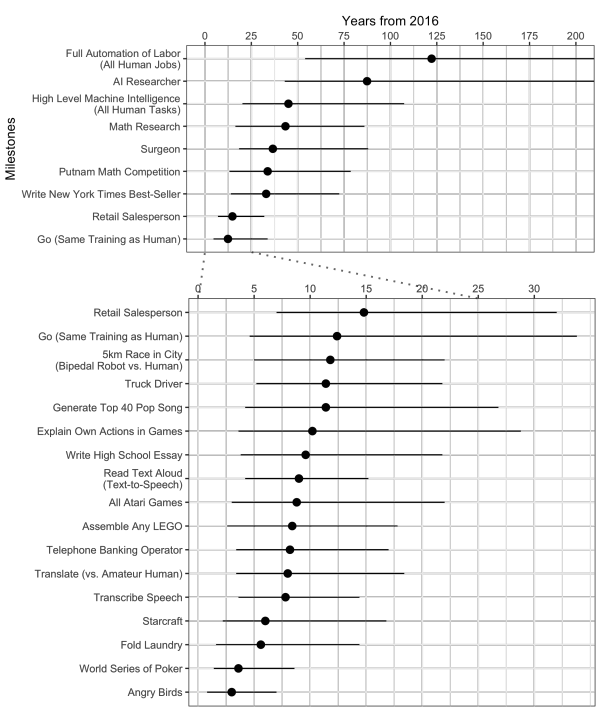Fossbytes reports:
There is a 50% chance of AI achieving the efficiency which would put it on par with humans, within the next 45 years. North American researchers estimated around 74 years for AI to outperform humans while the number was only 30 in the case of Asian researchers. Predicted changes are less likely to happen with the technology currently accessible to us. “This suggests that it is a number to be treated with caution.”
It was only a couple of days before when I was checking out my job security on the website Will Robots Take My Job? Now, a research conducted at the University of Oxford and Yale University explores the same concern, i.e when will AI overpower us humans. Could it be in the next 100 years or so? According to a survey conducted by the researchers which involved 353 responses (out of 1634 requests) from the AI experts who published at NIPS and ICML conferences in 2015 – There is a 50% chance of AI achieving the efficiency which would put it on par with humans, within the next 45 years.
The participants were asked to estimate the timing for specific AI capabilities like language translation and folding laundry. The superiority at specific occupations like surgeons, truck drivers, superiority over humans at all tasks, and the how these advancements would impact the society.
The researchers calculated the median figure from the data collected from various participants and created an estimated timeline which shows the number of approximate years from 2016 for AI to excel in various activities.
The intervals in the figure represent the date range from 25% to 75% probability of the event occurring, with the black dot representing 50% probability.
So, what do the numbers say? Would we have AI’s playing Angry Birds better than us in the next seven years? Would AI’s be able to replace those following-you-forever salespersons in the supermarkets, maybe in the next 15 to 30 years? In fact, you will be surprised to know that KFC has even launched an AI-powered store in China where the bots know which item you would prefer.
Similarly, you could expect AI surgeons opening up your body parts by 2060 and AI researchers creating more advanced AI by 2100. The research predicts that by 2140, AI would be able to almost everything that humans can do.
Clearly, these numbers induce a sense of insecurity amongst us. But still, it appears that the researchers have underrated the extent of the development currently going on in this field.
The report suggested a time span of around 12 years for AI to defeat humans in the game GO. But the recent news about Google’s AlphaGO winning over Chinese world champion Ke Jie says a different story about the future.
One important thing to consider here is the t speed of AI development. Experts based in Asia might have witnessed a faster growth rate than the ones in the United States. The researchers further noted that the age and know-how of the experts didn’t affect the predictions but their locations did.
North American researchers estimated around 74 years for AI to outperform humans while the number was only 30 in the case of Asian researchers.
Also, the 45-year prediction made for AI to outperform humans should be taken with a pinch of salt. It’s a long time span, often more than the complete professional life of a person. Thus, any of the predicted changes are less likely to happen with the technology currently accessible to us. “This suggests that it is a number to be treated with caution.”




















0 comments:
Post a Comment